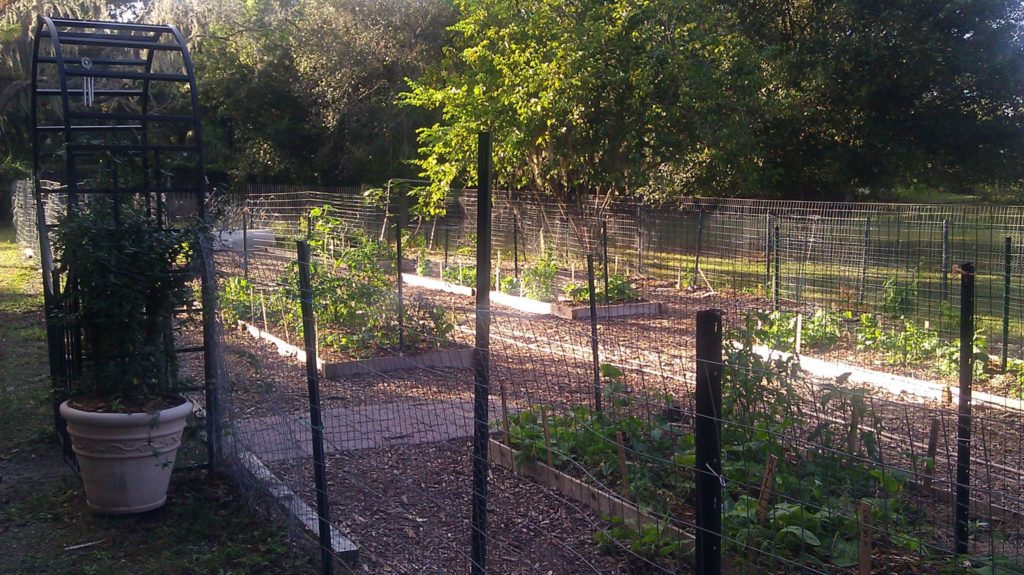 Hands down, my favorite thing about my children’s school besides a quality learning environment is their organic horticulture class.
Hands down, my favorite thing about my children’s school besides a quality learning environment is their organic horticulture class.
Not only do they learn about all aspects of organic gardening from prepping the soil to planting and composting, but they also help care for foraging goats and free ranging chickens.
The classes take turns collecting the eggs and the children even get to take them home to eat, which is no doubt quite the positive learning experience for any families that might regularly purchase conventional store eggs.
One week, my oldest child learned to fish with a net in the freshwater lake that borders the school campus. He was taught to cast the net properly as well as detangle the fish he managed to catch. He was so excited to tell me all about it in the car ride home that day and it was very cheering to hear his stories.

When it comes to planting, the children get to choose which seeds they wish to plant and care for. Two of my children brought home beautiful bunches of lettuce when Fall harvest time rolled around. We had fun determining which dishes would work best with the greens they proudly brought home.
 To the right is the giant ginger plant grown and tended by my oldest. I can’t wait until he brings it home and we can make some amazing homemade ginger ale with the roots!
To the right is the giant ginger plant grown and tended by my oldest. I can’t wait until he brings it home and we can make some amazing homemade ginger ale with the roots!
My question is, why can’t all schools have a program like this? It seems to me that teaching children to care for the land and learn how to produce their own food is as necessary and important a life skill as learning to read and write.
Just me.
While I’m sure my kids do not fully appreciate what they are learning in organic horticulture right now, I also feel quite sure that in the future, the memories of what they have learned will serve them well be it in the form of an easily pulled together backyard garden or possessing the know how to raise a few chickens to supply the family with quality eggs.
It gives me great peace of mind knowing that my kids already know so much more than I did at their age about producing their own food.
With the quality of processed foods continuing to decline and becoming ever more dangerous with each passing year with the unrelenting proliferation of GM foods and chemical additives of all kinds in our food, these types of community based skills will become increasingly more important in coming decades for simple maintenance of personal health, something today’s generations seem to take for granted.
Sarah, The Healthy Home Economist








While impressive and wonderful and personally matches my own feelings about the way things should be in all schools, some of the posted comments are disturbing. As a public school teacher for the last 11 years in Alaska, I can tell you that there is no government conspiracy that exists to brainwash children into believing that self reliance is bad, and there is no public school I know of that would turn down an opportunity to allow children to have this experience. There are many public schools in my area that do have gardens. And yes, we focus on academics because we HAVE to – remember, your public schools take ALL children – not just the privileged who have educated or financially stable parents who can either afford an alternative or have charters in the area. Public schools are mandated by a broken federal government system to improve and meet increasing targets every year. So when over half the children who walk through our doors are not prepared by their parents for school for various reasons, things like a weekly horticulture class aren’t really an option when research shows that students who are behind need twice the amount of instruction time to catch up.
Believe me, I want what you describe for my own children and for all children. I even believe it is possible for all children, but there are some major things that would have to change to make that a reality.
You know, I will be the first to admit that I am not in your world trying to educate underprivileged children, Sockeye1. But my impression as I read your comment was that gardens and other real life experiences are EXACTLY what those children need, certainly far more than double instruction time. You see, what we *privilieged* parents give our children is the opportunity to build connections to their world, not countless hours of instruction time before they get to school age! We introduce counting and reading skills naturally as we interact so that when it is time to sit down and do the actual learning, it is relatively painless; their minds are ready for it. It must be like taking hard, rocky ground that is not properly prepared and immediately planting to take those children and immediately immerse them in academics. I am sure it would be difficult to convince the *powers that be* to choose another course of action over their extensive research and education, but I continue to bet it would be exceedingly effective to give them a year or two of *real life experiences* before academics were the focus!!
Great response Pat in TX. I couldn’t have put it better. We entered kindergarten this year and a common question from his teachers (he has two) is what preschool did he go to? He is at the top of his class and this has not an ounce to do with preschool (never attended) or anytime sitting doing worksheets or drills. This has to do with our hours of outside time playing, getting dirty and lots of work alongside mom and dad. Relating the task at hand to the common threads of life. Amazing how they learn the basics without the drills and worksheets and with a passion. He is our second and the story is the same. Sure, he is a generally bright kid but no more than another.
Sockeye1 I get what your saying and I see how that has to be a very frustrating thing when kids come from homes that haven’t accurately prepared them. I really believe a little less time spent inside grinding the information into the brain and more outside time getting their hands dirty (growing a garden, collecting eggs, turning the compost pile) would actually allow these struggling kids to REALLY absorb the inside class lessons. I respect your argument but more class time no matter what the reports say isn’t what these kids need. A side-note being the healthy meal they picked may just be the only healthy thing they see/taste all day or week.
Cheers!
Our public school is getting a garden underway this year. There are a couple of public schools in the area who’ve maintained successful gardens. We live in the Northeast. There won’t be a greenhouse, nor do the other schools that do this in the area have one. The aim is to grow crops that can be harvested while the kids are in school, i.e. greens for a spring harvest and winter squashes and root vegetables that won’t be harvested until fall of the next school year. It will depend on volunteers to water and weed over the summer, but it’s definitely doable!
There is a public charter school in my area that also has a similar program so it is available in public schools as well as private, but still is pretty rare overall. The more parents ask for it though the more prevalent it will become.
When my kids were in school, they did the standard “plant a seed in a styrofoam cup” thing. Can you see my eyes rolling? I mean, it’s a start but it by no means teaches them about soil or land or seasonal weather patterns or anything else, much less about goats and chickens and cows. Thank heavens we were able to teach them about that kind of thing because the schools think if it’s not in a book, the kids don’t need to know it. That’s our “modern” way of thinking.
In our area of the country it’s too cold for most of the school year anyhow, unless they would make it a project of the entire school system and be provided a greenhouse, etc. THAT’S never going to happen. This city where I live just spent a half a million dollars each for three new gymnasiums, but they have no intention of spending a dime towards teaching kids about food or where it comes from or how it gets to the grocery stores – or why we shouldn’t eat the food in the stores for that matter (except the fresh produce). Nope. We have soccer fields and softball fields galore, which set unused for 9 months out of the year, we have gymnasiums that are empty and dark most of the time. I guess it all makes sense to someone. Education has become politics as usual.
That’s wonderful! I’m sure not all urban schools can really do that, as it would require some funds to set up a greenhouse, etc. It’s also a lot easier in the south! Not a whole lot can be grown here in New England in the winter unless you have a toasty greenhouse.
Yes, the weather down here makes it very conducive for gardening pretty much the entire school year.
most chicago public school kids often don’t even have recess! how blessed your kids are…
{I taught at a charter that had a greenhouse, until a bunch of gangbangers smashed all the glass}
🙂
Another added benefit to working in the school garden is that the children have time to quietly reflect on things that they have learned during the day. I don’t know why schools feel it is necessary to just keep cramming information into kid’s heads without letting them think through ideas. Hooray, for a school that sees the benefits of this!
Yes, that is so true. At a younger age, things can get overly focused on academic achievement and loads and loads of work and this is to the detriment of the child.
Hey, that’s why we’re homeschooled! We have an organic horticulture class every time Mom takes the kids to the farmer’s market, or we visit the goats from which we get our milk, or whenever we go out into the garden and grab a snack! 😀
Amen! My kids tend their own garden after their home lessons 🙂 I am learning along side them as well.
What a great school! We are moving to Florida and I hope we can find just an amazing school like yours. If not there is always homeschool. How cool for your kids!!!
One reason why they don’t do it is because it teaches people to be self-reliant, which is exactly what the government doesn’t want, since there’s no money in it.